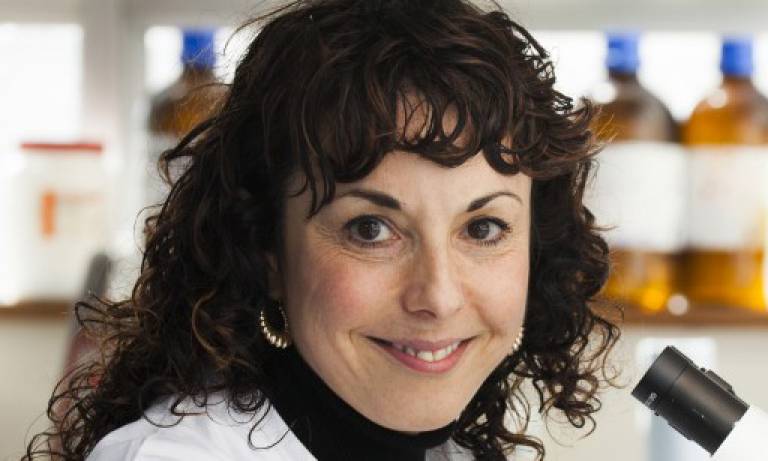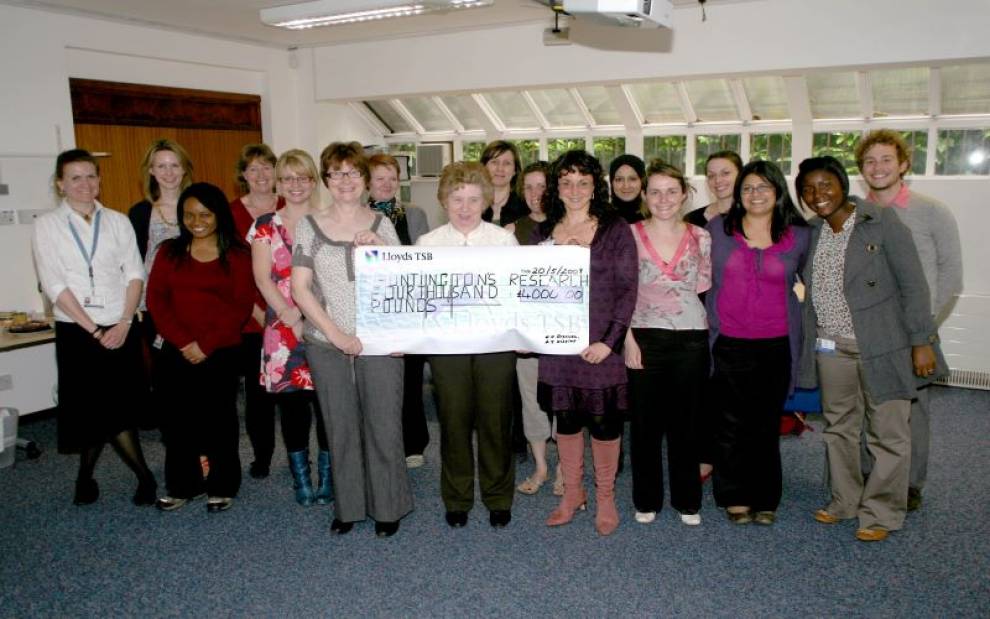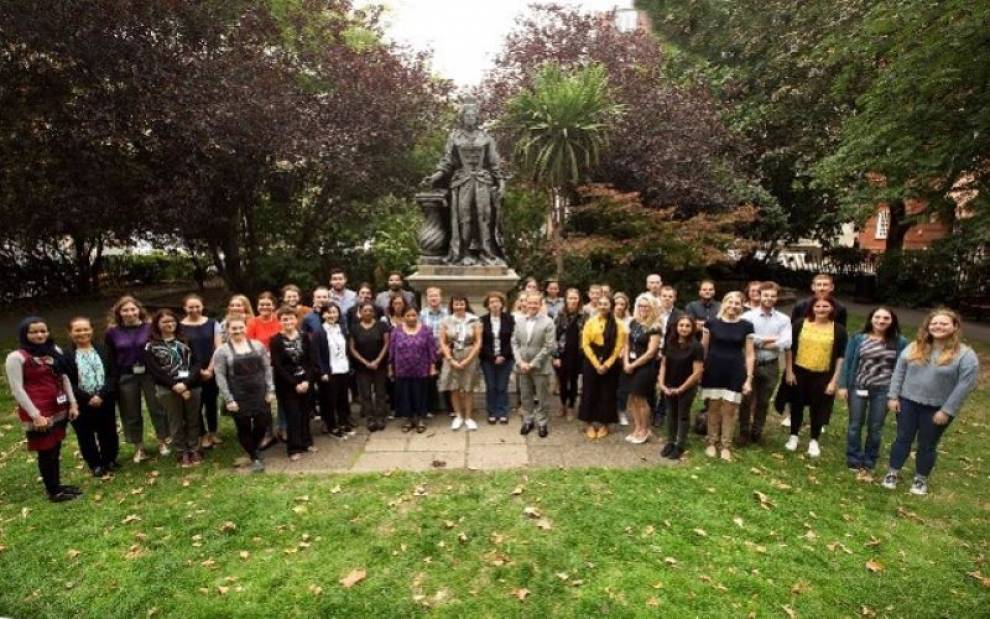Feature: In conversation with 2022 MRC Millennium Medal winner Professor Sarah Tabrizi
12 December 2022
Clinical neuroscientist and UK Dementia Research Institute (DRI) Group Leader at UCL, Professor Sarah Tabrizi has been at the leading edge of the search for Huntington’s disease treatments for over 25 years.

Her breakthroughs have, and continue to, push the field forward at pace and bring real hope to those affected by this heart-breaking neurodegenerative disorder. For her outstanding efforts and achievements, Professor Tabrizi is recognised with this year’s prestigious MRC Millennium Medal.
Reflecting on her career to date, passion for scientific investigation and tireless drive to deliver a cure for her patients, Professor Tabrizi (UCL Queen Square Institute of Neurology) said: "I really loved medicine and I became very excited about neuroscience. Edinburgh’s medical department was quite old school and in the second year you literally spent a year dissecting a human brain.”
Professor Tabrizi first encountered Huntington’s disease during her MRC Clinical Training Fellowship PhD at UCL studying mitochondrial dysfunction in neurodegeneration, when supervisor Professor Tony Schapira (UCL Queen Square Institute of Neurology) took her to a nursing home to collect skin biopsies from people living with disease.
She said: “I met many patients and families at that time, and they all had advanced disease. It really struck me the way the disease affected young people, because these were people who were in their 20s, 30s and 40s with end-stage disease, still able to interact and recognise me. It was very moving.”
Huntington’s disease is caused by the build-up of the mutant huntingtin protein in neurons. This leads to progressive cellular death, manifesting as a devastating worsening of coordination, involuntary body movements and mental ability. In most cases, it is inherited, and a child of an affected person will have a 50% risk of developing the condition.
Upon becoming a full professor in 2009, Professor Tabrizi took the decision to dedicate all her efforts to studying and finding much-needed treatments for the disease. With her former PhD co-supervisor and long-time collaborator Professor Gill Bates (UK Dementia Research Institute at UCL & UCL Queen Square Institute of Neurology), she established the UCL Huntington’s Disease (HD) Centre in 2016. Although scientific curiosity led Professor Tabrizi into the field, it’s now the hope of those she cares for that drives her work.
Professor Tabrizi said: “I have looked after generations of patients and families from 1997 when I started doing clinics, and sadly all of them have died. I've looked after people in their teens and 20s. Fathers and sons, mothers who have lost their husband and three children to the disease. And I’ve got to know them very well. I am absolutely passionate and committed to finding a treatment for Huntington's disease. I really do feel like it's my life's work and I focus on it to the exclusion of lots of things. I realised that focus is the most important thing for me.”
As a clinical neuroscientist, that motivation pushed Professor Tabrizi to publish over 350 scientific publications and drive multiple pioneering projects to transform the Huntington’s disease field. This includes our understanding of the underlying biology, how we predict, monitor and measure disease, when best to intervene and how to optimally run clinical trials. Professor Tabrizi was also responsible for designing and running the ground-breaking global phase I/IIa trial of IONIS Pharmaceutical’s antisense oligonucleotide (ASO) therapy, whose results made headline news in late 2017 for delivering the first demonstration of antisense-mediated suppression of a toxic protein in adults with a neurodegenerative disease.
For Professor Tabrizi, collaboration is at the heart of this progress, and critically contributes to both her development and that of the field.

She said: “All of my work over the years has been really collaborative. I have a close community both at the HD Centre with Professor Gill Bates, Professor Ed Wild and Dr Rachael Scahill (all UCL Queen Square Institute of Neurology), many others at UCL Queen Square Institute of Neurology, and a global network worldwide. That's why I really suffered in the pandemic because I really missed the travelling and interaction with every one of my colleagues. So I'm a big fan of collaboration and I see it as the only way that we’ll be able to find treatments for these diseases. It's definitely not a one-person race.”
It is not just interactions with her established peers that Professor Tabrizi values, from working for Professor David Marsden and Professor Anita Harding at UCL Queen Square Insitute of Neurology in 1994, who pioneered the fields of movement disorders and neurogenetics respectively, to linking up with researchers working on exciting new avenues such as DNA repair expert Dr Gabriel Balmus (UK DRI at Cambridge), but also her mentorship of the next generation of scientists continuing this vital work.
Over the past 16 years, she has successfully brought through 33 PhD students, including 17 clinicians. Having worked her way to the top in a predominantly white male field, equality, diversity and inclusion are also an upmost priority to Professor Tabrizi. As with her research, she leads from the front.
Professor Tabrizi explained: “I'm really keen to encourage diversity. I think when you're brought up being the child of a first-generation immigrant, you see the kind of difficulties your parents have faced. I've also been very involved with the Academy Medical Sciences’ mentoring program, Sustain, for young women scientists. I've helped solve quite a few big issues because these are all things that I've experienced, and then managed to get support myself to get through.
One of the most important skills Professor Tabrizi is keen to press on her mentees is their relationship with failure.
She said: “I don't know anyone who hasn't failed at some point. It’s important to learn resilience because when I was doing my first postdoc with Charles Weissmann, a brilliant scientist, I sent off a paper containing some great data, I thought. One of the reviewers came back and wrote, 'If this had been submitted 20 years ago, it would have been exciting', and I was really upset. At that point Charles told me I would need to grow a thicker skin to survive science.”
No more acutely has this type of disappointment been felt than when the Phase III trials of the pioneering ASO therapy for Huntington’s disease were abruptly stopped in March 2021, as patients in the treatment group were progressing worse than their placebo counterparts.

She said: “It was very hard to take and a few days later I had to give a talk to around 700 patients and their families. We hadn’t seen the data and we didn't know yet what had gone wrong. If I’m being really honest, it wasn’t the disappointment for myself, but for all the devastated patients and the families. The patients that I work with are amazing, and I was very upset for them. They were really grief-stricken.”
Despite this setback, Professor Tabrizi remained hopeful and keen to squeeze every bit of knowledge gained from that failure to ensure better, safer trials. Future trials will also benefit from her other pioneering developments including biomarker safety data and the recently developed four-stage Huntington’s disease staging system for defining disease progression, similar to that which has revolutionised the cancer field. This will facilitate clinical trials decades before clinical onset.
It is perhaps the most tragic aspect of Huntington’s disease, that defines the greatest strength of the community around it. As Professor Tabrizi explains: “A parent, children, siblings, grandchildren can be affected... It is a disease of families. For everyone who works in the field, some even with the mutant gene themselves, we often feel like we're part of the Huntington’s family, and the patients are very much part of that.”
It’s through her various roles - researcher, mentor, colleague, director, spokesperson, advocate, triallist, clinician – and the care Professor Tabrizi takes in performing them, that she inspires and pulls this family together.
And on remaining focused and delivering those desperately needed treatments, she said: “I'm not going to give up. I'm very tenacious. Like a dog with a bone!”
Links
- Professor Sarah Tabrizi's academic profile
- UCL Queen Square Institute of Neurology
- UCL Brain Sciences
- MRC
- MRC Millenium Medal
Images
(From top)
- Professor Sarah Tabrizi
- Professor Sarah Tabrizi receiving a donation from patients and their families
- Professor Sarah Tabrizi with colleagues at the UCL Huntington’s Disease Centre in 2017
Media contact
Alex Collcutt
UK DRI, Research Communications Manager
 Close
Close

